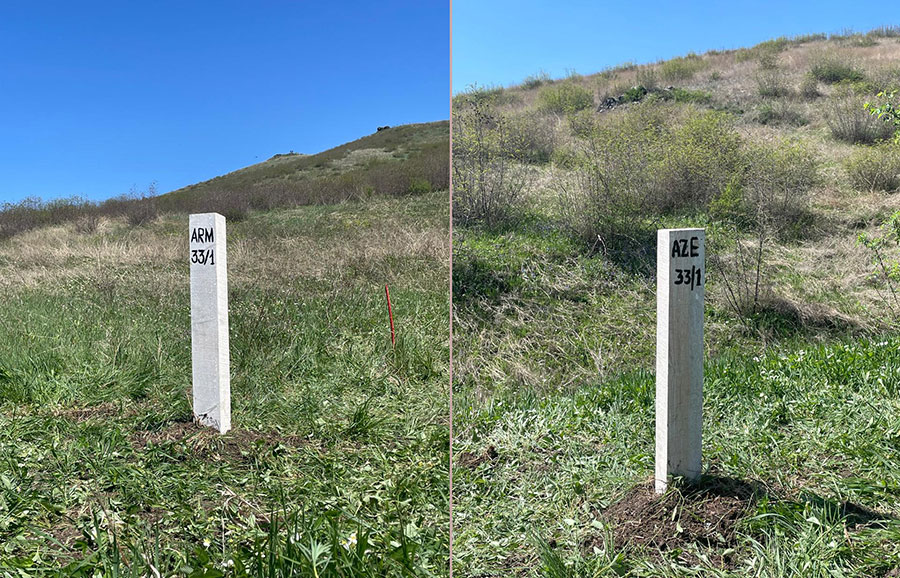The Armenian government on Tuesday provided little clarity on its negotiations with Azerbaijan regarding border delimitation, with the office of Deputy Prime Minister Mher Grigoryan representing Yerevan in the process only reaffirming that these talks were ongoing.
In a written statement sent to RFE/RL’s Armenian Service one month after its request for comment on why Yerevan and Baku apparently failed to agree on a document setting the principles of border delimitation by July 1, as previously agreed, Grigoryan’s office did not provide a clear answer regarding the matter, instead citing a statement from last month, indicating that negotiations were continuing “in a constructive manner.”
“It is planned to complete these negotiations in the near future and then proceed to the demarcation of the remaining parts of the border, including enclaves and exclaves,” the statement added.
In May, Armenia and Azerbaijan completed a controversial border demarcation process involving several sections of the frontier between the Tavush region of Armenia and the Qazax district of Azerbaijan. The process, which began with a mutual agreement on April 19, resulted in Armenia ceding control of four villages that were previously part of Soviet Azerbaijan, as well as certain territories of Armenian villages, according to 1970s maps used in the process.
Read also
The move, which was criticized by the opposition as a unilateral concession, sparked local protests that escalated and eventually reached Yerevan, culminating in clashes between riot police and protesters outside the Armenian parliament on June 12.
In their joint statement before launching the process Armenia and Azerbaijan announced that they would adopt by July 1 “regulations” for joint activities of their commissions dealing with the delimitation and demarcation of the nearly 1,000-kilometer-long border.
The regulations are supposed to lay out the principles for delineating the rest of the heavily militarized frontier. Armenian officials have said that these principles will lay the groundwork for Azerbaijan’s recognition of Armenia’s territorial integrity.
The two sides gave no reasons for their failure to meet the July 1 deadline. In virtually identical statements issued on that day they said they were continuing to negotiate “constructively” and planned to agree on the regulations “soon.”
The Armenian opposition construed that as a missed deadline and a failure of official Yerevan’s diplomacy to reach agreement on full border demarcation despite territorial concessions.
Speaking to RFE/RL’s Armenian Service on Tuesday, opposition lawmaker Tigran Abrahamyan pointed out the “unprecedented secrecy” surrounding the Armenian-Azerbaijani border negotiations at this stage. He noted that details are often revealed to the Armenian public either by Azerbaijani officials or by officials of intermediary countries.
“Naturally, under these conditions, when we look at the border demarcation process — especially its complex, problematic and nuanced issue — the Armenian authorities seek to limit the disclosure of relevant information as much as possible,” he said.
Abrahamian claimed that the Armenian government had been concealing Azerbaijani demands for the return of four villages for an extended period. The opposition lawmaker alleged that this was part of a strategy to create the impression that Yerevan was actively addressing the issue of agricultural lands and pastures from 31 Armenian villages currently held by Azerbaijan, suggesting that the process was “reciprocal.”
“Time has shown – and I am sorry to say this – that in reality Azerbaijan had set clear demands, and the Armenian government packaged it with beautiful words process… and, in fact, made unilateral concessions under the name of a border demarcation process,” Abrahamian said.
Opposition groups argue that the latest border demarcation has made Armenia potentially more vulnerable in the Tavush region in the event of another conflict with Azerbaijan, given the withdrawal of Armenian armed forces from strategically important areas.
Armenian Prime Minister Nikol Pashinyan has dismissed this criticism, contending that the alternative to the border demarcation would have been another war for which Azerbaijan would have had a legitimate pretext. He has also maintained that local Armenian communities are now better protected from a legal standpoint than they were before the demarcation.
The Armenian government has said it hopes that the demarcation with Azerbaijan will continue also in other sections of the border, including those where Yerevan accuses Baku of having occupied Armenian territories following a series of incursions in 2021-2022.




















































